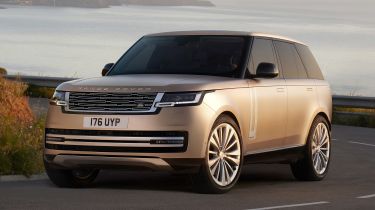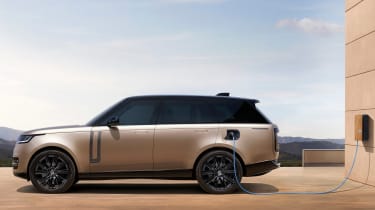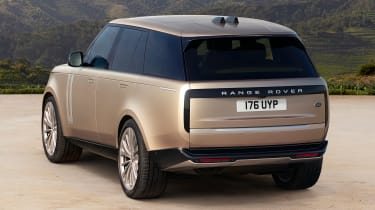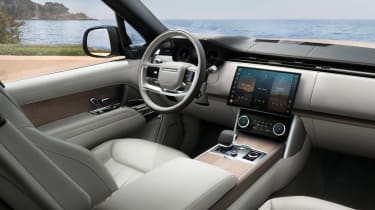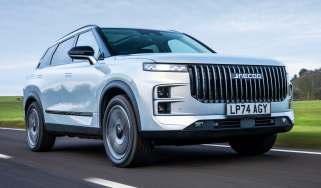New 2022 Range Rover: PHEV powertrains arrive
Fifth-generation 2022 Range Rover line-up expands as new P440e and P510e plug-in hybrid powertrains go on sale
- New Range Rover sits on all-new MLA-Flex platform
- Petrol, diesel, and hybrid versions confirmed with a full EV to arrive later
- On sale now starting from £94,400
Land Rover has announced full specifications of the new Range Rover’s plug-in hybrid powertrains, along with details of the range-topping SV specification.
For the fifth-generation Range Rover, the iconic luxury SUV has received an all-new design, an array of new engines, a vast suite of upgraded technology, and the option of seven seats for the first time.
The new Range Rover line-up starts from £94,400, and is on sale now. Underneath the metal, it sits on an entirely new platform that can accommodate a vast array of conventional petrol and diesel engines, and even a fully electric powertrain. The latter has already been confirmed, with a Range Rover EV slated to arrive in 2024.
Land Rover’s flagship model will be pitched directly against luxury SUV rivals including the Bentley Bentayga, BMW X7 and the Aston Martin DBX.
2022 Range Rover: engines and performance
In terms of powertrains, the biggest change over the old car is a pair of new plug-in hybrid engines. The PHEV line-up starts with the P440e, which combines a turbocharged 3.0-litre straight-six petrol engine with a 38.2kWh battery and an electric motor to produce 434bhp. Above this, the P510e uses a more powerful version of the same petrol unit and electric motor, pushing power to 503bhp. The latter is capable of 0-62mph in 5.7 seconds, and every PHEV model can manage up to 87mph in EV driving mode.
Alongside the EV driving mode, there’s a default Hybrid setting that uses both the petrol engine and the electric motor to maximise efficiency, including predictive energy optimisation and a Save mode to reserve the battery for zero-emission running in low-emission zones.
Claimed range for both the P440e and P510e stands at 70 miles on a full charge, a figure that beats those of luxury plug-in rivals such as the Bentley Bentayga by some margin.
Full details of fuel economy and CO2 emissions are yet to be confirmed, but the brand says the PHEV powertrains are capable of emitting as little as 18g/km in hybrid drive mode. The car has 50kW rapid charging capability as standard, with an 80% top up taking less than an hour. Charging via a home wallbox takes around five hours.
The regular petrol engine gets mild-hybrid assistance tech, and is badged P400. It’s powered by a 3.0-litre petrol engine producing 394bhp. This unit manages 0-62mph in 5.8 seconds, and returns up to 29.7mpg and emits 215g/km of CO2.
A pair of diesel engines is also available for higher-mileage drivers, with the D300 powered by a 296bhp 3.0-litre straight six. The D350 uses the same engine, but produces 345bhp. Economy for both engines is rated at up to 37.2mpg, with CO2 emissions starting from 198g/km.
The flagship P530 model gets a 4.4-litre twin-turbocharged V8 petrol engine producing 523bhp. When using Dynamic Launch, which helps it get off the line cleanly, it can accelerate from 0-62mph in 4.6 seconds and carry on to an electronically limited top speed of 155mph.
Every version gets an eight-speed automatic gearbox with the new Intelligent All-Wheel Drive system that can disengage the front wheels between 21mph and 100mph, to help improve efficiency.
Platform
The new Range Rover is the first model to sit on the new MLA-Flex platform, which can accommodate an array of powertrains including petrol, diesel, plug-in hybrid as well as electric, which is slated to arrive in 2024. This new platform makes the car up to 50% stiffer than the old model, and also incorporates Land Rover’s Dynamic Response Pro 48v active anti-roll technology, which helps reduce body lean in corners for improved handling and stability.
All-wheel steering is standard, and is capable of turning the rear wheels up to seven degrees at low speed. This gives the new car a 10.95-metre turning circle, a diameter that is less than some smaller family hatchbacks can manage.
In line with previous generations, the latest Range Rover is equipped with a vast amount of technology to boost its off-road ability. The gearbox has low-range capability, which is complemented by six driving modes and Land Rover’s Terrain Response 2 system to ensure the new car can cover a wide variety of terrains. It also gets a Wade Mode which raises the suspension allowing you to drive through water up to 900mm deep, along with 510mm of wheel travel to help the car over rough surfaces.
Styling
Land Rover has given the fifth-generation Range Rover a styling overhaul, with a subtle design that’s an evolution of the outgoing model’s. There’s a new front grille, which sits between sharper-looking LED headlights, and all of the car’s driver assistance sensors reside within the lower section of the bumper, giving it a clean look while also improving aerodynamics.
According to Land Rover, the design features fewer joins and lines in the bodywork giving it a smoother appearance. This can be seen at the rear of the car, where the tail lights morph with a full-width black panel across the iconic split tailgate design. From the side, the vertical inserts on the front doors have also been restyled, while the traditional ‘floating’ roof design has also been retained. Elsewhere, there will be no badging to indicate the engine or trim level on any model, and buyers will be able to pick from a range of new alloy wheel designs measuring from 20 to 23 inches in diameter.
Buyers will be able to personalise the new Range Rover with a choice of two special SV design themes. SV Serenity adds a metal-plated front grille, bronze exterior accents and matching coloured ‘Range Rover’ badging. It also adds an array of lighter two-tone interior trim choices. Alongside this, the SV Intrepid theme adds a sportier exterior look with Anthracite trim pieces along with a range of darker interior trim finishes.
Both SV themes add ceramic exterior badges, and matching ceramic trim inside, including the gear selector and rotary control dials. Additionally, buyers can also opt for the SV Signature Suite, adding a raised centre console to the four-seat model. This houses a retractable table in the centre, and a drinks fridge and crystal champagne glasses in the middle of the two rear seats.
Interior, practicality and technology
Inside, the new Range Rover has adopted all of the brand's latest technology with updated dashboard design housing a new curved 13.1-inch Pivi Pro infotainment touchscreen. This system features a simplified menu system, with around 90% of functions accessible within two clicks of the home screen. Connectivity has also been improved, with over-the-air-software updates and wireless Apple CarPlay and Android Auto. The system also offers integration for both Spotify and Amazon Alexa.
A new 13.7-inch digital dial cluster also features, and buyers can spec a pair of additional 11.4-inch touchscreens for rear passengers. To keep electronic devices topped on the move, wireless charging, USB C charging ports and a 230v three-pin plug socket are dotted around the interior. Active noise cancellation also features, and has five times the range of previous systems helping to filter outside noise coming into the cabin.
The biggest change to the new model is the introduction of a seven-seat option for the first time. In standard-wheelbase guise, there’s a choice of five seats or a four-seat layout with individual rear seats. Above this, the extended long-wheelbase model can be specced with four-seats, or with six- or seven-seat layouts when ordered with the third row of seats.
Thanks to a 200mm-longer wheelbase (the distance between the front and rear wheels), the LWB model offers up to metre of legroom in four-seat guise, while speccing the individual rear seats in both the regular and LWB specifications adds an extra 44mm of legroom for rear passengers.
Interior storage has been improved over the old car’s, with an array of storage trays and cubbies around the cabin. Both the regular model and LWB version get a 725-litre boot when specced with five seats. When equipped with seven-seats, the LWB variant offers 712 litres of storage with the rearmost seats stowed, and 312 litres with all rows in place. With all rear seats folded flat, storage space expands to 1,841 litres in the regular model and 2,601 litres in the LWB version.
Pricing and specifications
At launch, the new Range Rover can be specced in SE, HSE and Autobiography trim levels alongside a limited-run First Edition model. The D300 in SE trim starts from £94,400, while the P400 acts as the entry-point in the petrol range starting from £98,000. The HSE model starts from £100,000 in D300 form, with the Autobiography trim pushing the starting price up to £114,300. The First Edition trim will be sold for the first year of production only, with prices starting from £123,500 for the D350 model.
The long-wheelbase five-seat model is only available in Autobiography and First Edition trims starting from £120,000. The seven-seat model is available from the SE trim onwards, with a starting price of £103,200.
Pricing for the plug-in hybrid models starts from £103,485 for the P440e in SE trim, with the plusher HSE-spec model costing £109,425. Autobiography and First Edition trims are priced from £122,765 and £127,105 respectively for the short-wheelbase models.
The P510e is limited to the short-wheelbase model and the higher trim levels, with the Autobiography model starting from £126,445, rising to £128,055 for the First Edition trim.
At the top of the range, the Range Rover SV editions start from £146,200 in short-wheelbase form, rising to £173,200 for the V8-powered P530 model. The P510e plug-in hybrid starts from £149,400 in SV trim.
How does the current Range Rover compare to its rivals? Read our rundown of the best luxury SUVs to find out.
Recommended

New Subaru Trailseeker revealed as rugged electric SUV with 375bhp

New Subaru Solterra brings more range, power and polish
Most Popular
Tips & advice

Car dashboard warning lights: what does each symbol mean?

Electric car charging stations: public networks, charger types, apps and maps


